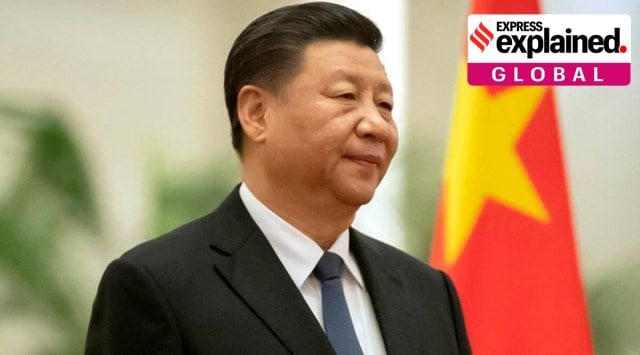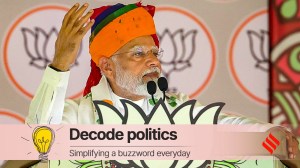- India
- International
Explained: What is the Chinese govt’s ‘sinicization of religion’ push?
Sinicization means transforming religious beliefs, faith, practice, rituals in accordance with Chinese culture and society.
 China’s President Xi Jinping and Argentina’s President Alberto Fernandez issued a joint statement last week that said China “reaffirms its support for Argentina’s demand (File)
China’s President Xi Jinping and Argentina’s President Alberto Fernandez issued a joint statement last week that said China “reaffirms its support for Argentina’s demand (File)At a national conference on religious affairs, held from December 3 to 4, Chinese President Xi Jinping stressed on sinicization of religions in China and wished to fully implement the Communist Party of China’s (CPC) theory on religious affairs.
Xi emphasised the importance of “upholding the principle of developing religions in the Chinese context, and providing active guidance for the adaptation of religions to socialist society,” stated a statement released by the Chinese government.
What did the national conference on religious affairs entail?
The national conference on religious affairs was attended by senior Chinese leaders including Li Zhanshu, Wang Huning, Zhao Leji and Han Zheng along with Xi Jinping.
Xi talked about fully implementing the policies of the Chinese government on religious affairs and freedom of religious beliefs.
He said the religious groups should strengthen their self-management and talked about the need to work on and improve the laws governing religious affairs.

A big part of Xi’s speech included urging citizens of all religions to seek to adapt to a socialist society.
He said, “Efforts are needed to better rally and guide religious believers to work together with the general public to develop China into a great modern socialist country in all respects and realize the Chinese Dream of national rejuvenation.”
Talking about religions in China, Xi said they have largely been Chinese in orientation and religious groups have enhanced the recognition of “the motherland, the Chinese nation, the Chinese culture, the CPC and socialism with Chinese characteristics”.
Urging religions to adapt to a socialist society, Xi also stressed sinicization of religions in China. He further said that sinicization would enhance self-management in the religious world, improve legalisation of religious affairs, organise and guide religious believers to work with the citizens and strive for construction of a powerful socialist society.
According to the statement, Xi said that there was a need “to establish robust leadership, uphold and develop a religious theory of socialism with Chinese characteristics, work in line with the Party’s basic policy on religious affairs, and uphold the principle that religions in China must be Chinese in orientation”.
Xi consistently urged religious groups to manage religious works and operate in accordance with the laws of the state.
“Religious activities should be carried out within the scope stipulated by laws and regulations, and should not impair the health of citizens, offend public order and good morals, interfere with educational, judicial and administrative affairs as well as social life,” he said.
 What does sinicization of religion mean?
What does sinicization of religion mean?
Sinicization means aligning religious beliefs and faiths, of any religion, to China’s culture, religious and political ideology, and religious rules.
Sinicization means transforming religious beliefs, faith, practice, rituals in accordance with Chinese culture and society.
It is not the first time that Xi has called for sinicization of religion. He has often urged the citizens to follow religion in line with rules of the country and to further socialism.
Sinicization is both political and religious. Xi doesn’t just expect citizens of all religions to adapt to sinicization but also wants the leaders of the country to embrace socialism and adhere to the state’s religious stand.
According to South China Morning Post, a Hong Kong-based media organisation, religious affairs in China have been under stricter watch since 2015, when sinicization was introduced. Over the years, this has brought religious beliefs under party control and has required religions to align with Chinese culture and reject foreign influence.
China’s religious demography
According to a white paper released in 2018 by the Chinese government, major religions practised in China are Buddhism, Taoism, Islam, Catholicism, and Protestantism and there were nearly 200 million religious believers in the country.
Out of these religious followers, the majority were Buddhists in Tibet. Others include 20 million Muslims, 38 million Protestant Christians and 6 million Catholic Christians.
There are nearly 144,000 places of worship and 5,500 religious groups in China including “seven national organisations which are Buddhist Association of China, Chinese Taoist Association, China Islamic Association, Chinese Catholic Patriotic Association, Bishops’ Conference of Catholic Church in China, National Committee of the Three-Self Patriotic Movement of the Protestant Churches in China, and China Christian Council”.
How has China repressed religious activities?
The national conference on religious affairs was held in the backdrop of accusations of repressive control over Muslims and Christians living in China and tight supervision over religions, according to South China Morning Post.
Last month, the US designated China among other countries as a country of particular concern for violation of religious freedom.
The United States Commission on International Religious Freedom stated, “Religious freedom conditions in China continue to deteriorate. The communist Chinese government has created a high-tech surveillance state, utilizing facial recognition and artificial intelligence to monitor and harass Christians, Tibetan Buddhists, Falon Gong and other religions. Independent experts estimate that between 900,000 and 1.8 million Uighur, Kazakh, Kyrgyz, and other Muslims have been detained in more than 1,300 concentration camps in Xinjiang.”
Newsletter | Click to get the day’s best explainers in your inbox
A few months ago, China was accused of removing domes and minarets from mosques across the country citing foreign religious influence.
China has been long accused of mistreating Uighur Muslims, which make up for less than half of Xinjiang’s population, and detaining them in camps to educate, re-educate and train them.
China has also been accused of detaining Christians for transformation and training.
More Explained
Must Read
EXPRESS OPINION
Apr 23: Latest News
- 01
- 02
- 03
- 04
- 05








































